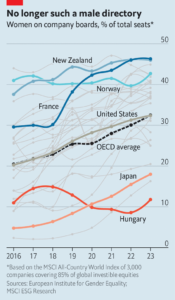
Your browser does not support the <audio> element.
A FILM FROM 2011 entitled “Limitless” is often credited with driving an uptick in interest in products that improve focus or enhance memory. It depicts a struggling writer whose life is transformed by a smart pill. More recently the real-life version of nootropic supplements, as such boosters are called, have received celebrity endorsements. Bella Hadid, a supermodel, is behind Kin Euphorics, a brand which offers consumers the chance to “achieve an elevated state of health, mood or well-being”. Joe Rogan, the alpha-male host of the world’s most popular podcast, endorses “Alpha Brain”, which, he says, “seems to fire up” that organ.
Alpha Brain is made by Onnit, a supplements firm co-founded by Mr Rogan in 2010 to “inspire a journey towards total human optimisation”. The brand caught the eye of Unilever, a soup-to-soap conglomerate, which bought it for an undisclosed sum in 2021. Its consumer-goods rivals have piled in. Reckitt Benckiser, the parent company of brands such as Durex and Strepsils, sells Neuriva. They are competing with—and eyeing up—a slew of supplements startups. Polaris, a research firm, reckons global sales of nootropics, which hit $11bn in 2021, will grow at an average annual rate of almost 15% until 2030.
Nootropics are usually an alphabet soup of ingredients: amino acids such as L-theanine, herbal extracts such as ashwagandha, probiotics, vitamins and a bewildering variety of mushrooms. Neuriva contains branded forms of coffee-fruit extract and phosphatidylserine, a type of fat. The ingredients are being combined to form novel products that claim to offer various brain-stimulating benefits. Their emergence has coincided with a post-pandemic interest in wellness. They appeal both to older consumers concerned about cognitive decline, and to younger ones keen to excel in the face of millennial angst (and to imitate Mr Rogan and Ms Hadid).
To manufacturers, their appeal lies both in growing demand and, as David Ridley of Citeline, a research firm, points out, in the ease with which supplements can be put on the market. Many countries regulate the health claims that can be made for products but also leave their producers plenty of wiggle room. It helps that it is hard to say whether nootropics actually work. There is some evidence that they might. Andrea Utley, an expert in motor control and development at the University of Leeds and a self-professed nootropics sceptic, tested one supplement. Her randomised study found that it speeded up decision-making and improved memory.
But few such studies are conducted. So doctors urge caution. Richard Isaacson, of the Institute for Neurodegenerative Diseases in Florida, recalls a patient whose liver function was so “all over the place” that it pointed to too much boozing. It turned out it was in fact too much Lion’s mane, a mushroom with supposed nootropic benefits. Trying to arrest cognitive decline with lab-tested supplements tailored to an individual patient’s needs is one thing, Dr Isaacson says. Stimulating an unimpaired brain without knowing what risks lie down the road is another. Perhaps he should start a podcast. ■
To stay on top of the biggest stories in business and technology, sign up to the Bottom Line, our weekly subscriber-only newsletter.
















